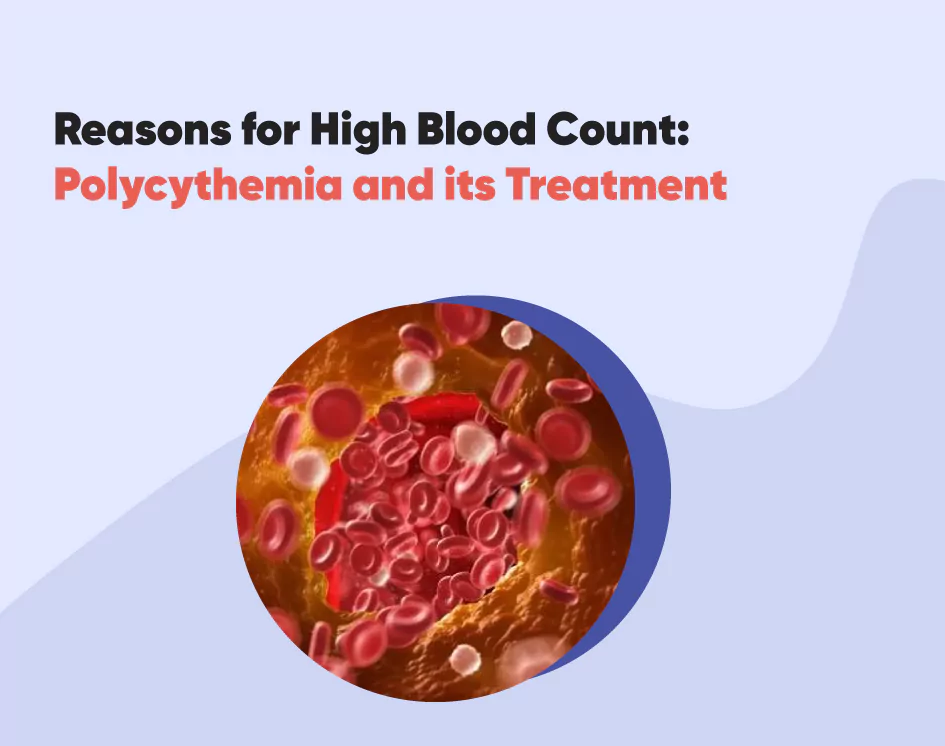
Reasons for High Blood Count: Polycythemia and its Treatment
Have you ever wondered why some people have a higher-than-normal count of red blood cells in their bloodstream? It’s a condition known as polycythemia, and it can be quite intriguing to explore the reasons behind it. Polycythemia is when you have too many red blood cells in your blood. Red blood cells are the ones that carry oxygen to your body.
They are essential, but having too many of them can cause problems. Your blood can become thicker and slower, and this can increase your risk of blood clots, stroke, heart attack, and other complications. You may also feel tired, itchy, dizzy, or have trouble breathing.
Reasons for High Blood Count
There are different reasons for high blood count polycythemia. One reason is that you have a rare type of blood cancer that makes your bone marrow produce too many red blood cells. This is called polycythemia vera or primary polycythemia. Another reason is that something else is causing your body to make more red blood cells. This is called secondary polycythemia. Some of the things that can cause secondary polycythemia are:
- Low oxygen levels in your blood: This can happen if you have lung disease, sleep apnea, or live at high altitudes.
- Smoking: This can reduce the oxygen in your blood and make your body produce more red blood cells.
- Kidney tumors. These can release a hormone that stimulates your bone marrow to make more red blood cells.
- Dehydration. This can make your blood more concentrated and increase the number of red blood cells.
Types of Polycythemia
In the context of our discussion on polycythemia, it’s important to recognize that this condition can manifest in different forms, each with its distinct characteristics and underlying causes. Understanding the types of polycythemia is crucial for accurate diagnosis and appropriate treatment. Let’s explore the primary types of polycythemia:
Primary Polycythemia (Polycythemia Vera)
Primary polycythemia, often referred to as polycythemia vera (PV), is a rare bone marrow disorder characterized by the overproduction of red blood cells, white blood cells, and platelets. Unlike secondary polycythemia, this type is not associated with external factors or underlying health conditions. PV is typically driven by a mutation in the JAK2 gene, leading to uncontrolled blood cell production.
Secondary Polycythemia
Secondary polycythemia, as the name suggests, occurs as a secondary response to external factors or underlying health issues that stimulate the body to produce more red blood cells. Some of the common causes of secondary polycythemia include:
Low Oxygen Levels: Conditions such as lung disease, sleep apnea, or residing at high altitudes can result in lower oxygen levels in the blood. In response, the body increases red blood cell production to compensate for the reduced oxygen-carrying capacity.
Smoking: Smoking reduces the oxygen-carrying capacity of the blood, leading to increased red blood cell production as the body attempts to enhance oxygen delivery.
Kidney Tumors: Tumors in the kidneys can release hormones that stimulate the bone marrow to produce more red blood cells, contributing to secondary polycythemia.
Dehydration: Dehydration can lead to a higher concentration of blood, which can cause an increase in the red blood cell count.
Understanding these distinct types of polycythemia is essential for healthcare professionals to determine the most suitable treatment and management approaches. The type of polycythemia a patient has will influence the course of medical interventions, including phlebotomy, medications, and lifestyle adjustments. Regular monitoring and accurate diagnosis are pivotal in ensuring that individuals with polycythemia receive appropriate care tailored to their specific condition.
Treatment Options
The treatment for polycythemia depends on the cause and the severity of your condition. Some of the common treatments are:
- Phlebotomy: This is when a doctor removes some of your blood to lower the number of red blood cells. You may need to have this done regularly to keep your blood count under control.
- Medications: These can help reduce the production of red blood cells or prevent blood clots. Some examples are hydroxyurea, aspirin, and anticoagulants.
- Lifestyle changes: These can help improve your blood flow and oxygen levels. Some examples are quitting smoking, drinking enough water, and exercising regularly.
Take away
If you have polycythemia, you should see your doctor regularly and follow their advice. They can monitor your blood count and adjust your treatment as needed. If you are looking for a qualified and experienced doctor to help you with polycythemia, you may consider visiting Dr. Karuna Kumar. You should also watch out for any signs of complications, such as chest pain, shortness of breath, headache, or numbness. If you have any of these symptoms, you should definitely seek medical attention right away.








